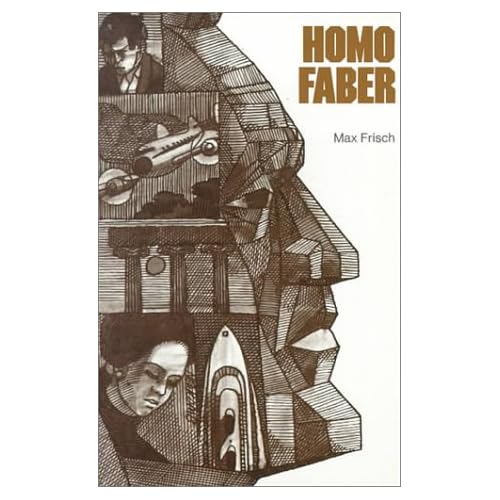Thanks to suggestions/gifts from Connie, Eleni, and Pelin...
Here's a list:
Homo Faber: A Report Max Frisch, 1957

"The novel is in the form of a first-person narrative, written by Walter Faber, a successful engineer travelling through Europe and America. Faber's world-view based on logic and probability is challenged by his falling victim to an incredible coincidence. The novel is a keystone in the portrayal of the post-holocaust modern human being. The novel has clear allusions to Sophocles's Oedipus Rex."Note: Wiki says: Homo faber (Latin for "Man the Smith" or "Man the Maker"; in reference to the biological name for man, "Homo sapiens" meaning "man the wise") is a concept articulated by Hannah Arendt and Max Scheler. It refers to humans as controlling the environment through tools. In anthropology, Homo faber (as "the working man") is confronted with "Homo ludens" (the "playing man," who is concerned with amusements, humor and leisure). It can be also used in opposition or juxtaposition to "deus faber" (god the creator, the making god), an archetype of which are the various gods of the forge.
 Ficciones Jorge Luis Borges, 1944
Ficciones Jorge Luis Borges, 1944 "Generally considered to be Borges’ masterpiece, Ficciones is a collection of seventeen original short stories. [..] Ficciones explores the labyrinthine nature of reality and the impact of language on literature, philosophy, metaphysics, and theology. Many stories are concerned with imaginary books penned by fictional authors, and more then a few engage in flights of meta-reality where reality and fiction are seamlessly intertwined. "Note: The novel is simultaneously a deconstruction of all scientific methods. wonderfully written and difficult as it may be, it amused by the simple fact that it was written in the post-WWII era. I still have to finish this one.
Beloved Toni Morrison, 1987
"Beloved is a novel based on the impact of slavery and of the emancipation of slaves on individual black people. It examines both the mental and physical trauma causedNote: I'm still reading it. An scarily vivid fiction, with a bit of a difficult language, but so far it is catching.by slavery as well as its effect on survivors. The major theme of this novel is the relation between a community and one's identity. Why does the mother who murdered her daughter insist living in the haunted house where the crime is committed? What is the relation between Sweet Home, the black community and the haunted house? How do they contribute or undermine one's identity as an individual person? One cannot get away without confronting these questions after this novel."
 Aşk Elif Şafak, 2009
Aşk Elif Şafak, 2009 "The novel probes the connection between Ella Rubinstein, a middle-aged housewife a living in Boston in the 2000s, and Mevlana Rumi, who lived in Konya in the 1200s."Note: I read her for the first time; I liked it a lot, but that's expected as I love the story of Rumi and Shems since I was a teenager... Rumi is the ultimate poet of love, both human love, and godly love: in him the differentiation collapses, or rather melts. So at least as an intro to Rumi, this story of his life reconstructed is a wonderful, and easy-to-read start.
"A "wilful extremist" according to the London Times, Hélène Cixous is hailed as one of the most formidable writers and thinkers of our time. From collaborating with acclaimed performance company Théâtre du Soleil, to producing a weighty body of both fiction and non-fiction, Cixous is celebrated for her brilliant contributions to contemporary culture. Acclaimed by luminaries such as Jacques Derrida, her writing has nonetheless been misunderstood and misread, to a surprising extent. With the inclusion of Stigmata, one of her greatest works into the Routledge Classics series, this is about to change.Note: Unfinished. I lost the book somewhere between Italy and Greece; although, the reason I wasn't finishing it was that I so enjoyed each and every sentence and Cixous has such an exceptional way of transforming you -as a person, as a student, as a woman, all of it- that I was trying to take it slowly... It's the most amazing piece of philosophy I have read in months! Highly recommended!
Questions that have long concerned her - the self and the other, autobiographies of writing, sexual difference, literary theory, post-colonial theory, death and life - are explored here, woven into a stunning narrative. Displaying a remarkable virtuosity, the work of Cixous is heady stuff indeed: exciting, powerful, moving, and dangerous."
Dream I Tell You Hélène Cixous, 2006
"For years, Hélène Cixous has been writing down fragments of her dreams immediately after awaking. In Dream I Tell You, she collects fifty from the past ten years. Cixous's accounts of her dreamscapes resist standard psychoanalytic interpretations and reflect her lyrical, affecting, and deeply personal style. The dreams, reproduced in what Cixous calls both their “brute and innocent state,” are infused with Cixous's humor, wit, and sense of playfulness."Note: It was too early for me to read this book. I found it interesting, for a while, and then again, they are someone else's dreams. So the dreams about Derrida or Heidegger are great to read but after a while you get to know the cat, and how she feels about the cat, and all... No, that's a bit of an exaggeration. I liked to see how her subconscious works, I learned how insecure she also is in her dreams (maybe only so, but probably not) etc.
This is all I remember for the moment. Keep connected, 'cos there's more...
No comments:
Post a Comment